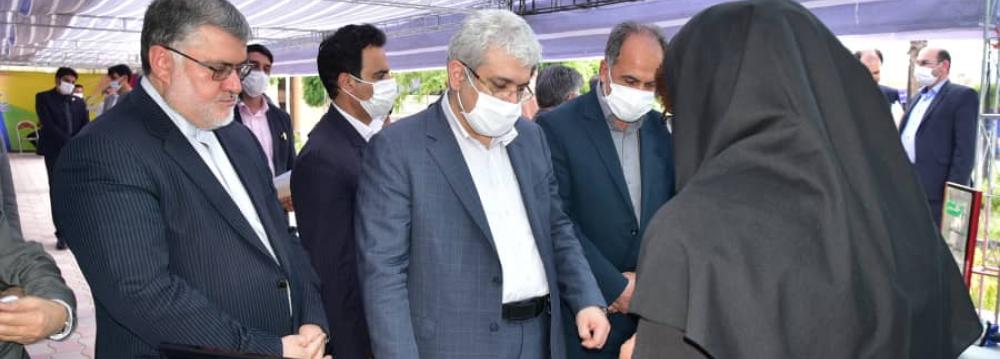Iran’s Vice Presidential Office for Science and Technology, a staunch supporter of startups, has suggested several measures to ease the hardships of knowledge-based companies and startups.
Speaking at a gathering of tech officials in South Khorasan Province on Monday, Sorena Sattari, the vice president for science and technology, emphasized the necessity of helping the growth of tech units in the country. He said knowledge-based firms and startups need not grapple with basic requirements, Mehr News Agency reported.
“The tech units should not be worried about the lack of a workplace. In case there is any incomplete or abandoned building, my office will finance their restoration and preparation for startup use.”
He added that insurance and tax fees should be waived for the tech units. “Establishing an office to specifically address such issues can help them get rid of frustrating processes and extra expenses,” he said.
“The relevant financial resources should also be adequate to meet the units’ financial needs in the form of loans and grants.”
Sattari emphasized that promoting a knowledge-based economy is the most efficient and affordable strategy to address the current economic headwinds and remove impediments in the way of boosting domestic production.
For promoting a knowledge-based economy, Iranian officials believe that the conventional oil-based economic system should be upgraded and the country’s dependence on natural resource revenues must be minimized.
To achieve this aim, authorities have been taking measures to support tech firms and startups, boost Iranian startups and develop technology ecosystem.
Establishing shared workplaces and offering financial aid are among the services offered to knowledge-based units besides technical, legal and commercial consultancy.
New Centers Join Tech Ecosystem
During his visit to Birjand University of Technology on the same day, Sattari inaugurated an innovation center affiliated to the university.
The center has become partially operational, offering a capacity for hosting 15 tech units. It will expand its housing capacity after it becomes fully operational.
Later, Sattari attended the inauguration of a startup accelerator in the city.
According to officials, the accelerator is aimed at curbing the issues facing the region, giving technical support to startups and tech firms working on environmental, health, robotic, electronic, cultural, tourism and waste management topics.
In line with promoting tech facilities in the region, Sattari inaugurated a provincial research and technology fund and a small-scale technology center called Ferdows during a videoconference, visited several tech units and inspected their products.
“South Khorasan Province offers a remarkable potential for hosting the elements of a growing knowledge-based community,” he said.
Hailing the large number of entrepreneurs and graduates in the region, Sattari said the talented and active business teams have boosted the province’s economy based on local capacities.
This capacity should be explored and utilized for strengthening the technology ecosystem, he added.
Nationwide Efforts
Extending support to new startups and technology firms has been on the government's agenda since 2013 when President Hassan Rouhani began his first term in office.
Over the past few years, numerous tech parks and innovation factories have been established throughout the country to offer shared workspace for tech units.
Currently, there are seven tech parks in Tehran Province, most of which are backed by major Iranian universities, including Tarbiat Modares University, University of Tehran, Sharif University of Technology, Iran University of Medical Sciences, Shahid Beheshti University and Islamic Azad University.
These tech parks carry the name of universities backing them.
Innovation factories in Tehran, such as Azadi and Highway, have also attracted numerous tech teams and startups.
Azadi Innovation Factory was launched in August 2018 at an abandoned chemicals factory near Azadi Square, west of Tehran. The center is backed by the Vice Presidential Office for Science and Technology and is managed by Sharif University of Technology.
Highway, the capital's second innovation factory, is under construction. The factory is being established in an old building near Nobonyad Square on the northeastern flank of Tehran.
Tehran is not alone in its push for establishing innovation factories and tech parks. Numerous centers have also been launched across Iran.
Innovation factories are to be launched in Iranian metropolises by the vice presidential office to expand the startup and knowledge-based ecosystems.
According to Qaderifar, innovation factory projects in the provinces of Khorasan Razavi and East Azarbaijan are almost complete and will become operational shortly.
“Tabriz in East Azarbaijan will get its third innovation factory when its construction project is completed,” he said.
"Feasibility studies are underway in Fars, Isfahan and Yazd provinces for introducing similar projects."
Qaderifar noted that the new projects resemble innovation factories in Tehran, namely Azadi and Highway.
“Provincial projects have also been established in abandoned factories to keep the projects cost-efficient,” he said.
The Roads and Urban Development Ministry, municipalities and governorates in the host cities are assisting the vice presidential office in implementing these projects.
At the innovation factories, startups and knowledge-based companies find legal, technical and financial support to develop their activities.
Given the avowed pledge of extending full support to those who are active in the tech ecosystem, Iran is expected to make its mark on the international stage.


